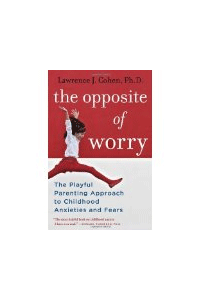“The Opposite of Worry: The Playful Parenting Approach to Childhood Anxieties and Fears”

“The Opposite of Worry: The Playful Parenting Approach to Childhood Anxieties and Fears”
By Lawrence J. Cohen
Random House Publishing Group
New York, N.Y. 2013
Book helpful for parents of anxious children
Reviewed by James K. Luiselli, Ed.D., ABPP, BCBA-D
Many children experience chronic anxiety, persistent worry and specific fears. Indeed, childhood anxiety is one of the most common clinical problems seen by mental health professionals. Unless properly treated, anxiety disorders can create serious psychosocial challenges among children and youth at school, within the family and later adulthood.
This book, by psychologist Lawrence J. Cohen, was written for parents of anxious children. His therapeutic approach, which he calls playful parenting, stresses facilitative, supportive and nurturing relationships between parent and child. The book is filled with illustrations and case vignettes that are intended to explain how parents can and should deal with situations that provoke anxiety and associated difficult behavior in their children.
Cohen first introduces parents to the biological and social causes of childhood anxiety through a basic overview of temperament, physiology and fight-or-flight responding. Like much of the book, he relies on simple metaphors and code words to explain concepts and the underlying assumptions of his approach. For example, he writes about “The Security System” to analyze “how anxiety is triggered, experienced, expressed and completed.”
The majority of chapters in the book detail various parent strategies for helping children cope with and overcome anxiety. The key methods entail reassurance, validation, emotionally neutral language, modeling and positive regard, among others. Another common anxiety-reduction technique, relaxation, is recommended in the context of physical play or “roughhousing.” Cohen borrows from a number of treatment modalities in presenting his integrated model.
On the topic of a child confronting anxiety and fear, the author offers advice that is consistent with contemporary evidence-based practices without actually naming specific procedures or their research foundation. Therefore, his numerous depictions of playful parenting encompass exposure therapy, cognitive-behavioral treatment, mindfulness and behavioral activation. Clearly, Cohen kept technical jargon out of the dialogue, a reasonable decision given his audience and desire to hold their attention!
The book wraps up with a chapter about the most common childhood anxieties, namely worry, fears, social anxiety and trauma, each one addressed through the author’s parenting approach. He adds to his list of suggested methods with reference to narrative therapy, scheduling “worry time,” and behavior rehearsal, to name a few. Not all of the methods will resonate with parents but the many options provide suitable choices that can be tailored to each family’s circumstances.
“The Opposite of Worry” is an informative resource for parents and other family members. The book is easy to read, comprehensive and notable for its many practical suggestions that are linked to acceptable practices.
Cohen is keenly aware of communicating effectively with a non-professional audience, which he does admirably. In effect, most parents should be able to learn from the book and apply many of the procedures with beneficial results.
It’s also a solid book for child and family professionals within multiple disciplines. The author’s advice can be incorporated within therapy sessions, used as a guide for consulting with parents and many of the techniques can be adopted creatively to enhance therapeutic success.
James K. Luiselli, Ed.D., ABPP, BCBA, is senior vice president, applied research, clinical training and peer review at the May Institute in Norwood, Mass.
Learn more about the book: The Opposite of Worry: The Playful Parenting Approach to Childhood Anxieties and Fears
